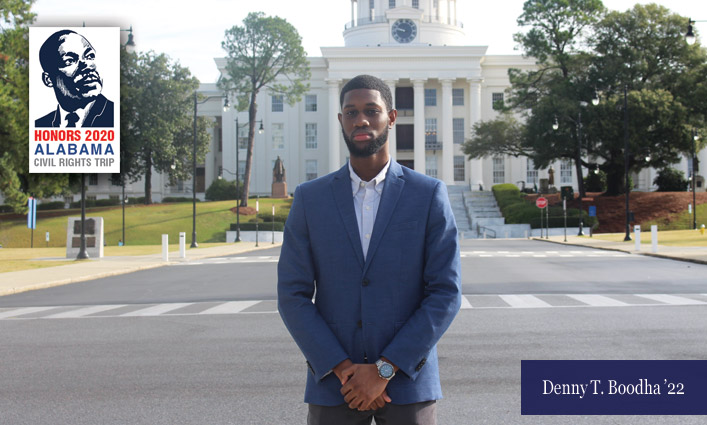
After a full day of visiting exhibits, museums, and historic sites on the 2020 Honors Alabama Civil Rights trip, the students participate in reflection sessions. These group meetings offer a safe space for anyone to share their feelings about the day’s events. On the third day of the trip, during one of our reflection sessions, Denny T. Boodha ’22 shared a compelling metaphor that described the similarities between racism and energy.

“Energy can have a negative impact on the environment, depending on how it is expressed, and racism will have negative impacts if it is expressed through oppression rather than being checked when we have these natural biases.” —Denny T. Boodha
His Essay
During my Honors Colloquium class I was given an assignment by Dr. Raymond Patton, which became a reflection on racism. While working on the assignment, I got into a debate with my younger brother, who is a science major. He believed that being a science major was more difficult than being a humanities major. During that debate, I looked at my brother and realized that we were opposite sides of the same coin. I started to think about our educational choices and wanted to see where the two disciplines coincided.
While reflecting on racism, I thought about the fact that racism was so heavily embedded in our blood. I started to believe that there was no way of completely eradicating it, because it keeps changing forms. Using the principles of physics with regards to energy, I realized that racism, like energy, transforms from one form to another. Just as wind energy turns a windmill to create electrical energy, racism, by our actions, changes and has changed from one form to another. You can see it through the years of slavery, Jim Crow laws, and mass incarceration.
Racism is not created or destroyed, just as energy is not created and cannot be destroyed. As human beings we are naturally biased individuals, and as such are naturally racist. Energy can have a negative impact on the environment, depending on how it is expressed, and racism will have negative impacts if it is expressed through oppression rather than being checked when we have these natural biases.
Fire provides heat and light energy, but when unchecked it can be dangerous—for example, if it spreads through a forest it can cause mass casualties and the loss of life will be catastrophic. In this same breath, we see how checking our naturally biased impulses creates peace among each other because we see people for who they are rather than who we initially and naturally perceive them to be. If we fear and resent people due to racial differences, our actions based on these negative connotations will cause catastrophic loss of life and mass casualties, as we have seen in slavery as well as contemporary society when oppression causes the loss of livelihood.
- Honors 2020 Alabama Civil Rights Trip: Pre-Trip Excitement and Expectations
- Honors 2020 Alabama Civil Rights Trip: Exploring Selma
- Honors 2020 Alabama Civil Rights Trip: A Conversation with John Jay President Karol V. Mason
- Honors 2020 Alabama Civil Rights Trip: A Reflective Poem From Isaac Paredes ’21



